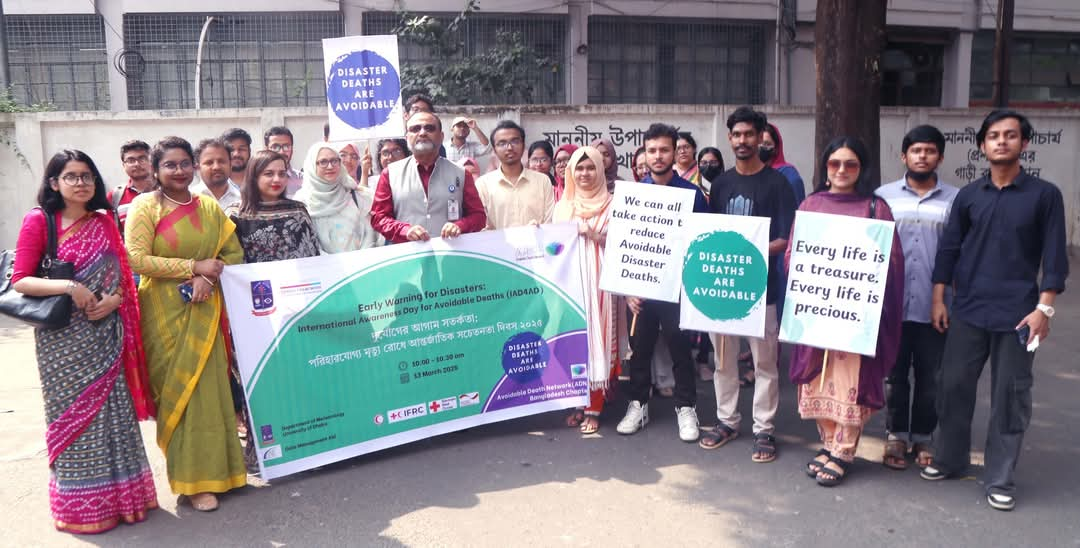
Celebrating International Awareness Day for Avoidable Deaths (IAD4AD) in Bangladesh 2025
The ADN Bangladesh Chapter, in collaboration with the Department of Meteorology, University of Dhaka, organized a special event on March 13, 2025, in Dhaka to celebrate the International Awareness Day for Avoidable Deaths (IAD4AD) 2025. Led by Dr. Fatima Akter, Chairperson of the Department of Meteorology and Bangladesh Lead of the Avoidable Deaths Network, the program, titled "Early Warning for Disasters: International Awareness Day for Avoidable Deaths (IAD4AD)", brought together experts, policymakers, and practitioners to highlight the crucial role of early warning systems in reducing disaster-related fatalities. The event featured a rally to raise awareness about preventable disaster deaths, followed by a seminar with keynote presentations and a panel discussion, fostering dialogue on strengthening disaster preparedness and response mechanisms.
The Avoidable Deaths Network (ADN) is a global initiative dedicated to reducing preventable disaster-related deaths, particularly in low- and middle-income countries. ADN works to improve disaster preparedness, early warning systems, and risk governance, aligning with the Sendai Framework for Disaster Risk Reduction and the Sustainable Development Goals (SDGs). Founded at the University of Leicester, UK, and Kansai University, Japan, ADN launched its Bangladesh Chapter in June 2023, led by Dr. Fatima Akter, Chairperson of the Department of Meteorology, University of Dhaka. The chapter works on research, advocacy, and collaboration to enhance disaster resilience. ADN also introduced International Awareness Day for Avoidable Deaths (IAD4AD) on March 12, observed annually to promote global efforts in disaster mortality reduction.
The program began with a rally at 10:00 AM, starting from the Vice Chancellor’s office premises and concluding at Shahid Minar. The Honorable Vice Chancellor of the University of Dhaka, Professor Dr. Niaz Ahmed Khan, inaugurated the event. He said that Bangladesh is among the most disaster-prone countries, but our capacity to tackle such challenges is gradually increasing. Through awareness initiatives like this, we can spread knowledge on disaster preparedness among the general public and vulnerable communities. Appreciating such efforts and expressing hope for more awareness programs in the future, the Vice-Chancellor officially inaugurated the rally. The rally brought together students, faculty members, disaster management experts, and policymakers to advocate for stronger early warning dissemination and community-based preparedness.
The seminar commenced at 11:00 AM following the rally, where detailed discussions were held on early warning systems for disasters and the prevention of avoidable deaths. Faculty members of the University of Dhaka and experts exchanged views on disaster management, forecasting, and ways to enhance public awareness.
At the beginning of the seminar, Dr. Fatima Akter, Chairperson & Associate Professor of the Department of Meteorology, University of Dhaka, Head of the ADN Bangladesh Chapter, and the seminar’s chairperson, delivered the inaugural speech. She welcomed all guests and discussant and provided an overview of the purpose, goal, and activities of the Avoidable Deaths Network (ADN).
Professor Dr. Nibedita Ray-Bennett, Co-Founder and President of ADN, expressed her enthusiasm for the rally and seminar through a video message.
The keynote speech was delivered by Professor Dr. Md. Zillur Rahman, Chairperson of the Department of Disaster Science and Climate Resilience at the University of Dhaka. He discussed disaster risks in Bangladesh, the effectiveness and challenges of the Early Warning System (EWS), and future improvements. Additionally, he emphasized policy recommendations, public awareness, and the role of various stakeholders in disaster preparedness and risk reduction.
Afterward, the discussants conducted a discussion featured Mr. Gaurav Ray, Head of the Bangladesh Office, German Red Cross, who emphasized that raising awareness in disaster-prone areas, particularly in coastal regions, can significantly reduce disaster-related mortality. He stressed the importance of community engagement initiatives to spread awareness among local populations. Dr. Fariha Haseen, Associate Professor, Department of Public Health and Informatics, Bangabandhu Sheikh Mujib Medical University (BSMMU), Dhaka, Bangladesh, highlighted the critical role of healthcare during disasters, noting that pregnant women, children, and the elderly are particularly vulnerable and require specialized healthcare services. Dr. Aminur Rahman, from the Centre for Injury Prevention and Research, Bangladesh (CIPRB), explained how his organization collects and analyzes disaster-related data and works to disseminate this information to coastal communities. Lieutenant Colonel Mohammad Tajul Islam Chowdhury, SGP, PSC, Director (Operations & Maintenance), Fire Service & Civil Defence Directorate, discussed recent devastating fire incidents, particularly the Bailey Road fire, and emphasized the importance of proper preparedness and safety measures in fire hazard management. Md. Momenul Islam, Director, Bangladesh Meteorological Department (BMD), elaborated on how BMD provides impact-based forecasting and utilizes real-time data to predict disasters. Shameem Hassan Bhuiyan from the Bangladesh Meteorological Department (BMD) spoke about BMD’s role in disaster management, highlighting how collaboration among different agencies can enhance disaster response capabilities. Throughout the discussion, the speakers emphasized the effectiveness of early warning systems in disaster management, policy recommendations, technological advancements, public awareness, and inter-agency coordination.
As the Special guest of the seminar, Professor Dr. Kazi Matin Uddin Ahmed, Dean of the Faculty of Earth and Environmental Sciences, delivered an address in which he praised the Department of Meteorology and ADN for organizing such an impactful event. He commended their efforts in raising awareness about disaster preparedness and response and emphasized that such awareness programs should not be limited to the University of Dhaka but should be extended to other universities across the country.The seminar successfully strengthened dialogue between stakeholders and reinforced Bangladesh’s commitment to enhancing early warning systems, ensuring no life is lost due to preventable disasters.
The celebration of International Awareness Day for Avoidable Deaths (IAD4AD) 2025 in Bangladesh was co-organized by Data Management Aid and supported by the Bangladesh Red Crescent Society (BDRCS) , the International Federation of Red Cross and Red Crescent Societies (IFRC) , the German Red Cross, and German Cooperation (Deutsche Zusammenarbeit) .